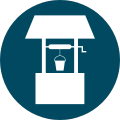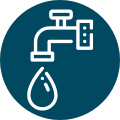
Our vision:
A safe and healthy Kitsap County for all.
1 & 2-Party Wells
Drinking Water & Onsite Sewage
Drinking Water
Does your drinking water come from a private well or a public water system?
It's important to know the source of your water so you can be confident that your water is safe and reliable.
Whether you are constructing a public water system or need a well inspection to sell your property, our goal is to help you have a safe supply of water.
Private well: serves up to two residential connections.
Public water system: any well that serves more than two residential connections.
They are classified into two groups:
Group B systems serve between 3 and 14 connections.
Group A systems serve 15 or more connections or 25 or more people per day for 60 or more days a year.
What You Need to Know About Properties Connected to a Septic System
A septic system is a critical part of a home. It collects, treats, and disposes of all water from toilets, sinks, tubs, showers, dishwashers, and other appliances.
Before buying or selling a home connected to a septic tank, make sure that you know the status of the septic system. Kitsap Public Health District can review records, inspect the system, and provide you with a written report of what we find. This is a great way to help protect your investment and follow regulations (Kitsap Public Health Board Ordinance 2025A-01, Section 13.D).
Before the final sale of a property, contact us for a property conveyance inspection (PCI) to identify any significant problems. Without an inspection, potential problems are not corrected and can cause major problems later on. For instance, a septic system my fail after new owners purchase a home, costing them thousands of additional dollars in repairs.
For us to perform a property conveyance inspection, we will need a record drawing. If your property does not have one, you will need to create one.
2025 Property Conveyance Inspection Findings
1,743 property conveyance inspections for septic were completed in 2025. Of those, 450 (27%) had significant deficiencies identified.
Avoiding Common Problems on Property Conveyance Inspections


Encroachment
Don’t build or park on your primary or reserve drainfield. Primary and reserve drainfield areas are intended to be maintained clear for maintenance and for future use.
Maintenance accessibility
For alternative systems, keep components accessible for maintenance.
Using beyond capacity or having unpermitted connections
Stay within the designed capacity of your drainfield design. To find out how many bedrooms your septic is approved for, search for your records through our GIS Search.
Do not add plumbing to outbuildings without project review and approval from Kitsap Health.
Compromised primary or reserve areas
Know where your septic areas are and protect them. To learn more about protecting those areas, review the Homeowner’s Guide
What You Need To Know About Properties Connected to a 1- or 2-party well or a Group B Water System
Effective March 4, 2019, all properties served by a Private or Group B Water System are required to have a Water Status Report from the Health District bfore they are sold.
Water Status Report applications (public and private) should be submitted 30 days before the property transfer to allow for any identified issues to be addressed before closing sale.
For more information, read our Private Water Status Report Frequently Asked Questions handout.
Just like a property conveyance inspection is important to know the status of a septic system, it is also important to evaluate your water system to identify significant problems.
2025 Private Water Status Report Findings
442 private water status reports were completed in 2025. Of those reports, 194 (44%) had significant problems identified.
Avoiding Common Problems on Private Water Status Reports
Construction Standards
Keep your well-head above grade and accessible (at least six inches above grade)


Well openings/access for contamination
Openings in the well casing/cap can allow contamination into the well. Ensure conduit, cap and all other entry points are sealed.
Ensure pressure tank maintenance is up to date and sample for bacteria annually. For more information about bacteria sampling, view our handout.

2025 Group B Water Status Report Findings
97 public water status reports for Group B systems were completed in 2025. Of those, 90 (93%) significant problems were identified.
Avoiding Common Problems on Public Water Status Reports
No user agreement
Group B user agreements have been required since 2019. All water systems should review their current user agreement or, if there isn’t one, create one. Learn more:
No operating permit
Group B water systems must have a current operating permit. Ensure water system contact information is up to date and the permits have been paid. For more information, visit our Group B Public Water Systems page.
No current samples
Most Group B water systems must sample annually for bacteria and every three years for nitrate. If you’re unsure of your sampling frequency or need technical assistance with taking samples, please call us at 360-728-2235 and ask to speak to the Drinking Water Inspector of the Day.
Reminder cards are mailed approximately 30 days prior to sample due date. Please make sure your system contact information is up to date.
How do I replace a well?
For all well replacements, you need to complete a Well Site Inspection Application for approval before you start construction. After approving the well site, we will need the following items to approve your water supply:
The Health District will inspect the well site before authorizing drilling. They will inspect again during the drilling process.
Your well driller must submit a copy of the water-well construction report (also called a well log).
Submit a copy of the pump test (usually done by your well driller) that proves your well produces at least five gallons of water per minute per residential connection.
A copy of a bacteria test (performed by a state-approved lab) is required showing that there are no bacteria in the well water.
A chemical analysis of your well water, showing the level of iron, manganese, nitrate, chloride, and conductivity (known as the “Kitsap 5”) will also be required. This test must be conducted by a state-approved lab.
Your well driller or a pump company must fill out and submit your private well system design worksheet.
Depending on the well’s location, we may require that you and your neighbors sign an agreement to abide by covenants that protect the well’s sanitary control area (well radius).
How do I find more information about water rights in Washington?
A 2016 Washington State Supreme Court decision (also known as the "Hirst decision") changed how counties decide to approve or deny building permits that use wells for a water source. In response, Washington state has a new streamflow restoration law.
More resources:
Water Rights | Dept. of Ecology
Water Right Permits | Dept. of Ecology
If you live in the Island Lake Aquafer, there are special well drilling restrictions in the Island Lake area.
What about abandoned wells? Do they need to be decommissioned?
Wells that are no longer in use are considered abandoned wells.
State law requires that any abandoned well must be properly decommissioned by a licensed well driller.
Abandoned wells that are not decommissioned are dangerous to people and animals. They are easy to fall into and can cause injuries, as well as provide an easy way for pollution to contaminate our water.
Filling a well with garbage or dirt is illegal.
The Process
If your well shaft is exposed, secure the top of the well to prevent a person or animal from falling into it.
Contract with a licensed well driller as soon as possible for decommissioning.
Submit a decommissioning application.
If your well is hand-dug, a licensed well driller will usually seal the well with concrete. Drilled wells require a more specialized process.
If you find an unused well that is not on your property, please contact us with the property owner's name and address.
Irrigation Waivers
If you want to keep your well for garden irrigation, you will need a waiver:
Irrigating more than one-half acre of noncommercial lawn and garden also requires a water-right permit.
More resources
Getting your drinking water tested
It is important to regularly test your drinking water for bacteria and nitrate and have the samples analyzed by an accredited lab.
The Health District recommends private well owners test for bacteria annually and nitrate every three years.
About drinking water contaminants
Please visit our Drinking Water Contaminants page for resources.
Fluoride in drinking water
Please visit our Fluoride In Drinking Water page for more information.










.png)
